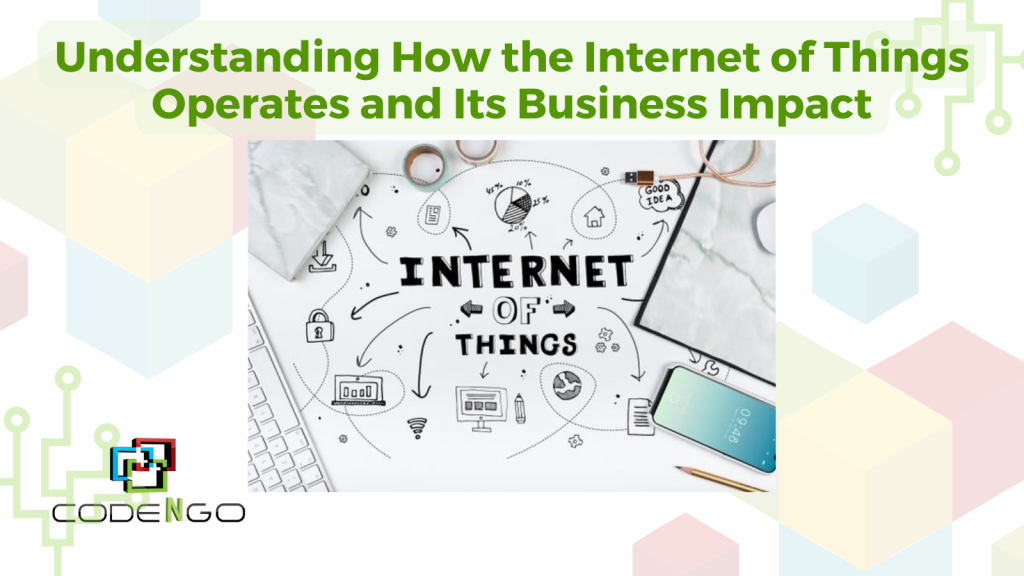IoT for Business: Navigating the dynamic realm of modern business necessitates more than mere adaptation—it demands innovation. Welcome to the era of “Leveraging IoT for Business,” a revolutionary strategy transcending the conventional, empowering enterprises to connect, analyze, and optimize their operations. This introduction delves into how businesses can utilize the prowess of the Internet of Things to enhance efficiency, foster informed decision-making, and unlock unprecedented avenues for growth. In the evolution of industries, the strategic integration of IoT becomes not just a technological decision but a crucial step toward future-proofing businesses in an interconnected and data-driven world.
What is IoT in a Business Context?
The Internet of Things (IoT) for business refers to the integration of smart, interconnected devices and systems into various aspects of organizational operations. These devices are equipped with sensors and communication capabilities, allowing them to collect and exchange data. The application of IoT in a business setting can lead to enhanced decision-making, improved efficiency, and the creation of new business models.

Key Components of IoT for Business:
- Connected Devices:
- Businesses deploy a variety of IoT devices, ranging from smart sensors and actuators to industrial machinery and vehicles.
- These devices are strategically placed to gather data relevant to the business operations.
- Data Analytics:
- The heart of IoT lies in data analytics. Businesses leverage sophisticated analytics tools to process the massive volumes of data generated by IoT devices.
- Advanced algorithms identify patterns, trends, and anomalies, providing valuable insights for decision-makers.
- Connectivity Solutions:
- IoT devices rely on various connectivity solutions such as Wi-Fi, cellular networks, and Low Power Wide Area Networks (LPWAN) to transmit data securely.
- Choosing the right connectivity solution depends on factors like range, data transfer speed, and power consumption.
- Cloud Computing:
- Businesses often use cloud computing platforms to store, process, and analyze IoT data. Cloud solutions offer scalability, flexibility, and accessibility from anywhere.
- Security Measures:
- As IoT involves the exchange of sensitive business data, robust security measures are crucial. Encryption, authentication, and secure communication protocols safeguard against cyber threats.
How Does IoT Work for Business?
- Efficient Operations:
- IoT enables businesses to monitor and optimize operational processes in real-time. For example, in manufacturing, sensors on machinery can provide insights into equipment health, reducing downtime and maintenance costs.
- Supply Chain Management:
- IoT facilitates end-to-end visibility in the supply chain. Businesses can track the movement of goods, monitor inventory levels, and ensure timely deliveries, leading to improved logistics and reduced inefficiencies.
- Customer Experience:
- Businesses can use IoT to enhance the customer experience by personalizing services and offerings. For instance, retail stores can implement smart beacons to provide location-based promotions to customers.
- Predictive Maintenance:
- IoT data analytics allows businesses to predict when equipment or machinery is likely to fail. This enables proactive maintenance, minimizing downtime and extending the lifespan of assets.
- Data-Driven Decision Making:
- With a wealth of real-time data at their disposal, businesses can make informed decisions, identify market trends, and adapt strategies swiftly to changing conditions.
Benefits of IoT for Business:
- Cost Savings:
- Improved operational efficiency and predictive maintenance lead to cost savings in the long run.
- Increased Productivity:
- IoT streamlines processes, reduces manual intervention, and enhances overall productivity.
- Innovation and Competitive Advantage:
- Businesses leveraging IoT can innovate in their products and services, gaining a competitive edge in the market.
- Enhanced Customer Satisfaction:
- Personalized experiences and efficient services contribute to higher customer satisfaction and loyalty.
In the business realm, the Internet of Things is not merely a technological trend but a strategic imperative. Embracing IoT allows organizations to stay agile, make data-driven decisions, and create new avenues for growth. As businesses continue to navigate the digital landscape, understanding and harnessing the power of IoT will be a key differentiator in achieving sustainable success.
Share this article on